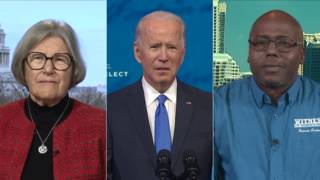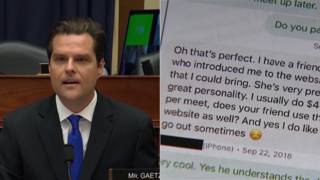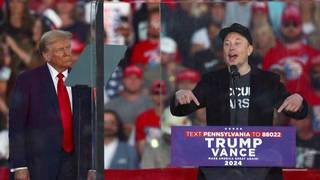
Related
The Justice Department has put off prosecuting more than fifty companies suspected of wrongdoing over the last three years. The decline in prosecutions is seen as a deliberate and dramatic shift in policy. While the news reported in a front-page article in the New York Times surprised many, the Justice Department’s use of so called “deferred prosecution agreements” is nothing new. Back in 2005, a report released by the Corporate Crime Reporter profiled dozens of these cases and warned against their use. We speak with Russell Mokhiber, editor of the Corporate Crime Reporter. [includes rush transcript]
Transcript
JUAN GONZALEZ: Why is the Justice Department increasingly avoiding corporate prosecutions? In a front-page article yesterday, the New York Times reported that the Justice Department has put off prosecuting more than fifty companies suspected of wrongdoing over the last three years. The decline in prosecutions is seen as a deliberate and dramatic shift in policy.
Rather than take corporations to court for high-profile cases, the Bush administration has instead relied on what are known as “deferred prosecution agreements.” These agreements impose fines and appoint an outside monitor to enforce internal changes at the company. Terms of the deals are often kept secret.
AMY GOODMAN: While yesterday’s New York Times article may have surprised many, the Justice Department’s use of prosecution agreements is nothing new. In fact, back in 2005, a report released by the Corporate Crime Reporter profiled dozens of these cases and warned against their use.
Russell Mokhiber joins us now, editor of the Corporate Crime Reporter, in Washington, D.C. Explain what they are, Russell.
RUSSELL MOKHIBER: Good morning, Amy. Good morning, Juan. As you pointed out, Amy, if you go to our website, corporatecrimereporter.com, and click on the left side, the report on the left side, it will pop up, and there’s the date: December 2005, “The Rise of Deferred and Non Prosecution Agreements.” And just as a prelude here, we sent that report out to all the major media outlets, and the only two to pick it up were Democracy Now! and Marketplace on NPR. So it was surprising to me to see this on the front page of the New York Times yesterday, and in today’s New York Times, an editorial titled “Going Soft on Corporate Crime,” which to me explained why the Times ran it, because they want to try and hook the Bush administration with going soft on corporate crime.
But as you and Juan and your listeners know, this is corporate-occupied territory. And we haven’t heard a peep out of the Democrats in Congress, not one member of Congress in the Senate or the House saying, “Let’s criminally prosecute serious corporate crimes to conviction,” because they don’t want to go back to that. The key here is they want to get rid of corporate criminal liability. This is what the corporations want.
So this is what used to happen. The Justice Department would have evidence of serious corporate crimes. They would criminally prosecute the company. They would either get a guilty plea or take the company to trial. And a jury would find the company either guilty or not guilty. And there were so many of these that at the end of the last decade, we put out a report called “The Top 100 Corporate Criminals of the 1990s,” and we just went through the ’90s, and we listed all of the corporations, all of the major American companies that had been convicted of crimes, and we ranked them by the amount of the criminal fine, from one to a hundred. And we cut it off at a hundred.
We’re not going to be able to do that for this decade. Why? Because what do the corporations fear most? They fear adverse publicity. They don’t want the kids in the backseat saying, “Mommy, don’t go to BP. They’re a corporate criminal. They killed fifteen workers in Texas.” They don’t want that. They don’t want to be labeled corporate criminals. The second thing they fear is probation. If a company is convicted of a crime, a judge can put a probation officer in the executive suite, so that if the company wants to dump pollutants into the river, the probation officer will report it back to the judge. So that’s the way — you can’t throw a corporation in jail, but you can restrict what it does.
So, as a result of that fear of corporate criminal liability, these white-collar crime defense lawyers, in connection with the Justice Department prosecutors, said, “Hey, we don’t need this. We’ll charge the company with a crime. We’ll come to an agreement, a deferred prosecution agreement,” which was intended for minor street crimes. It’s in the US attorneys’ manual, intended to unclog the courts from minor street crimes so you can deal with serious corporate crimes. “We’ll elevate these deferred prosecution agreements to major corporate crime cases, and we’ll settle them. We’ll say we’re charging you with a crime. You committed a crime. But we’re not going to force you to admit. We’re not going to force you to plead guilty. We’re not going to force you to trial.” And the result has been that there have been very few criminal convictions of major corporations over the last five or six years. And instead, we’re getting these deferred and non-prosecution agreements.
JUAN GONZALEZ: And, Russell, this happened after Enron, after WorldCom, after the huge scandals of the early part of the decade. That’s when they started deciding to, in the midst of a crime wave, to begin to adopt this type of policy?
RUSSELL MOKHIBER: Yes, what happened was, Juan, they used the Arthur Andersen case as an excuse to move toward this kind of settlement. Now, Arthur Andersen was dead in the water. You can’t be an accountant — you can’t have public trust as an accountant and be known as Enron’s auditor. So it had nothing to do with this criminal prosecution of Arthur Andersen. It had everything to do with the fact that Andersen was Enron’s auditor. So they were gone, but the Justice Department rightfully brought a criminal prosecution. They, in fact, offered Andersen a deferred prosecution agreement; Andersen rejected it. And that was the end of Andersen. Now, there are only four major accounting firms.
KPMG, by the way, one of the remaining four, was targeted by the Justice Department for a major criminal prosecution for these fraudulent tax shelters — promoting these fraudulent tax shelters, and the US attorney in New York was overruled by the Justice Department. The Justice Department imposed a deferred prosecution agreement.
Now, the back story on this is, the corporate crime lobby, both Democrats and Republicans, have for years, throughout most of the century, wanted to get rid of corporate criminal liability. And the Chicago School theorists put it this way: a corporation is not a person. Or as Jeffrey Parker put it, a corporation has no mind and therefore can commit no crime. And if a corporation isn’t a person, it shouldn’t be treated as a person in the criminal justice system. That’s their argument.
Well, my argument is, if a corporation is not a person and shouldn’t be treated as a person in the criminal justice system, then it shouldn’t have the constitutional rights of a person. It should be stripped of its rights to free speech, commercial and political speech. It should be stripped of its rights to a trial by jury. It should be stripped of its protection against unreasonable searches and seizures. You can’t have it both ways, but they want it both ways.
And this is not, as the New York Times put it in its editorial today, the Bush administration. I mean, he’s the corporate crime master-in-chief, but he’s got all the members of Congress, including Democrats, going along with him. There’s no effective opposition, and it’s a serious problem.
So what happens? We have an expanding — the corporations have expanding power, because the countervailing power of the Justice Department has been diminished. The budgets have been slashed. The prosecutions have been slashed. This has been tracked by David Burnham at TRAC at Syracuse University. And if you’re not going to criminally prosecute a corporation and bring it to justice, it’s going to continue to grow in its power, and that’s what’s happening here in corporate-occupied territory in Washington, D.C.
AMY GOODMAN: Russell Mokhiber, we’re going to have to leave it here for now, but we hope to talk to you again, because this obviously is an ongoing issue, with many more of these agreements expected, especially around corporations’ behavior on the subprime issue. Russell Mokhiber, editor of Corporate Crime Reporter.











Media Options